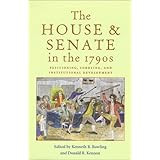
Average Reviews:

(More customer reviews)~House & Senate In 1790S: Petitioning, Lobbying, & Institutional Development~ is an interesting anthology of essays on the institutional development of the U.S. Congress, both the Senate and House of Representatives. The opening essay by John Kaminski lays the groundwork for understanding the constitutional framework behind the Congress. Collectively, the scholars tend to see lobbying as a nineteenth-century phenomenon, though they make it clear that these characters were there from the beginning. Being a strict constructionist myself, I was amazed at the efforts of some Americans to impugn the Constitution of strict enumerated powers almost from the inception of the United States in the 1790s. This book communicates a reality that lobbyists for unconstitutional appropriations and subsidies began flocking to Congress in much the same way flies are attracted to dung.
It features an essay on the Chisholm v. Georgia decision, and how it begged the question about individual rights and whether the federal government would serve a role in upholding them. The Chisholm decision ultimately provoked the 11th Amendment, and enshrined sovereign immunity into the fabric of the Constitution. The problem was there was no positive rights granted in the U.S. Bill of Rights. It was a negative.
Another essay captures the dynamics of the ratification of the U.S. Constitution in remarkable detail.
The closing essays focus on institutional development of the House and Senate, including the ascendancy of political parties, and congressional caucuses.
The book suffers from some structural defects, and an indicipherable snobbish sort of scholarship that detracts from its value. If understanding the First Congress is your priority, then it's probably better just to get Lance Banning's anthology entitled _Liberty and Order: The First American Party Struggle_ which features pertinent primary source documents from the 1790s related to institutional developments and party struggles in the First Congress.
The book has a cool cover though. A crude portrayal of a fight on the floor of Congress between Vermont Representative Matthew Lyon, a dyed-in-the-wool Republican, and Federalist Roger Griswold of Connecticut. Griswold bludgeoned Republican Lyon in the head with a cane. It's good to see that politicians stood their ground in the good ole days, rather than embrace that wimpish bipartisanship in an, "I love you, you love me," Barney the dinosaur chorus. We need more such gridlock today, that way Congress won't get anything done, and we will probably be better off for its non-action. If 'con-' is the opposite of 'pro-' than is 'congress' the opposite of 'progress?'
Click Here to see more reviews about: House & Senate In 1790S: Petitioning, Lobbying, & Institutional Development (Perspective History Of Congres)

No comments:
Post a Comment